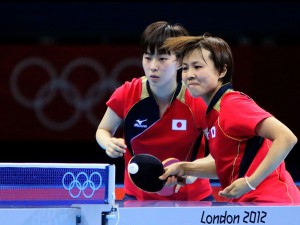
Japan’s table tennis players Kasumi Ishikawa (L) and Sayaka Hirano return the ball to Singapore’s Wang Yuegu and Li Jiawel during the women’s team semi-match of the London 2012 Olympic Games at the Excel centre in London on August 5, 2012. Japan won 3-0 to proceed to the final. AFP/MARWAN NAAMANI
LONDON – Japan’s women will need a large supply of hankies and tissues for their Olympic gold-medal match.
The Japanese trio of Ai Fukuhara, Kasumi Ishikawa and Sayaka Hirano won 3-0 against Singapore on Sunday, putting Japan in Tuesday’s women’s final and guaranteeing the nation its first medal in table tennis since the sport entered the Olympics in 1988.
China faces South Korea on Monday in the other semifinal.
China has already won two gold and two silver medals, and will be favored to win two more in the men’s and women’s team final.
Hirano and Ishikawa — playing doubles together — started crying as soon as they won the third and decisive set. Fukuhara joined instantly, and seconds later all three were using the others shoulders and shirt collars to absorb the happiness.
“It’s a great trio,” Hirano said. “I love my team.”
Added Ishikawa: “I want to thank these two girls. I’m so happy.”
Fukuhara, playing in her third Olympics, put Japan ahead 1-0 in the first set, beating Peng Tianwei — the bronze medalist in these Olympics. That was the momentum Japan needed.
“I knew when I won that first match, it had really damaged Singapore,” Fukuhara said.
Playing in her first Olympics, 19-year-old Ichikawa defeated Wang Yuegu in the second set, setting the stage for the deciding doubles in the best-of-five set format.
Japan’s women had never beaten Singapore in team play, a group composed to all China-born players. The same four won the silver medal in Beijing four years ago.
“We had nothing to lose, so we just went for it,” said Hirano, who’s playing in her second Olympics.
“This is something the Japanese have been waiting for, for ages,” she add. “Of course, the expectations were high. We knew that.”
Japan’s will have a day off Monday, a day to watch China play. Then reality may set in. The Chinese trio of gold-medalist Li Xiaoxia, silver medalist Ding Ning and Guo Yue will be big favorites.
The Chinese men and women have overpowered everyone.
Chinese men’s coach Liu Guoliang acknowledged Sunday his country’s lopsided victories damage table tennis’ image and don’t help generate much interest in the sport around the world. He’s not about to apologize, though.
The Chinese men dominated Singapore 3-0 on Sunday to reach the semifinals, another walkover victory. China is too good, and Liu knows it.
“We welcome talented table tennis players coming to China to learn the game,” said Liu, who won two gold medals in the 1996 Olympics. “We know it’s not so good, but we have a long history of the game in our country. … There is very big pressure on us to win, just like American basketball.”
China has won 22 of 26 gold medals in table tennis at the Olympics, and is likely to make it 24 of 28 when the tournament ends on Wednesday.
Three others reached the men’s team semifinals with victories on Sunday: Germany, South Korea and Hong Kong. Germany defeated Austria 3-0, South Korea beat Portugal 3-2, and Hong Kong defeated Japan 3-2.
China plays Germany, and Hong Kong faces South Korea in Monday’s semifinals.
Hong Kong’s victory amounted to another win for China, since all three players were born in mainland China, not Hong Kong — and Hong Kong is technically part of China.
Liu was asked if he understood that Chinese dominance might be — well — slightly boring.
“That’s a matter for the ITTF, not the men’s coach of China,” he said.
Timo Boll of Germany, widely regarded as the best non-Chinese player, is expecting support — even from some Chinese fans.
“Many Chinese have told me it’s also a little boring for them that China always wins, so I think they are also waiting for a close match. Tomorrow is the day we need a little more help from them (fans). Maybe the whole world is behind us, even some Chinese fans.”

